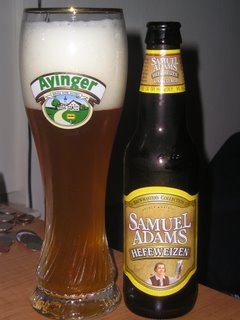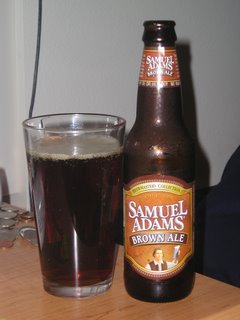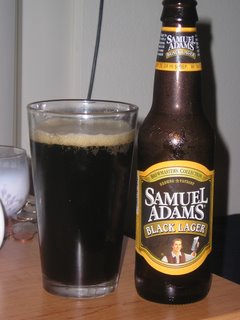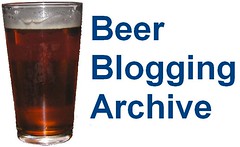Sunday Beer Blogging
You see what I did there? I made it sound like this is actually a weekly feature, that happens every Sunday. As though I have the discipline to actually stick to a schedule for anything. Well, I did do this last Tuesday...maybe this will be the beginning of a trend where I actually blog about beer once a week!
But I doubt it.
Anyway, this morning I was in a Ralph's supermarket at about 9 AM, walking through the beer section (as is my wont), and I saw something called a "Samuel Adams Mix Pack". This is a six pack in a little box that has two each of their Hefeweizen, Brown Ale, and Black Lager. Well, I've had the Black Lager before and kind of liked it, and I'd never tried the other two. After a long day of failure in the lab, I'm ready to sit back and enjoy all three. Here we go!
First up is the Hefeweizen:

This beer (poured into a hefeweizen glass) produced a huge head that dissolved after a minute or so, leaving a very nice lace. There's not a lot of carbonation left after all that, but it doesn't really hurt the beer too much. The beer is very cloudy in the glass.
As you bring the glass to your mouth, you get a hint of fruit, but the aroma isn't very strong overall, and it certainly doesn't have the strong hint of banana that I usually associate with this type of beer. The beer itself is the same - very light for a wheat beer, but that's not entirely a bad thing. This is a hefweizen that allows you to taste the fruit flavors on the aftertaste, and doesn't clobber you over the head with the taste of wheat; I guess some would say that doesn't make it a real hefeweizen. If you're looking for a more traditional, "real" hefeweizen, get something like Ayinger (whose glass I'm using here). Overall rating: 6/10.
Next we come to the Brown Ale; I've decided to go lightest to darkest tonight.

The brown ale poured with almost no head and a dark brown color. Again, not too strong of an odor, but what is there smells deep and roasted. The flavor isn't very strong at all, making this a drinkable beer in the tradition of other Sam Adams brews. The initial taste is pretty malty; the aftertaste is that roasted flavor with a hint of chocolate, and it lasts for a good long time. I'd call it a more interesting version of the ubiquitous Boston Lager. If you like the lager but want a little more flavor, this beer is for you. Overall rating: 6/10.
Finally we have the Black Lager. I've actually had this one before, which is why I saved it for last.

The beer pours with a nice thick head, and it's very dark - just looking at it it's black, but when held up to the light it's got an interesting reddish hue. It has a roasted aroma, similar to the Brown Ale but more so. The taste is almost like a stout; that roasted flavor is noticable at first (along with a bit of brown sugar), but fades away quickly to a smooth aftertaste. The flavor never really asserts itself, which is atypical for this style of beer. I like a black lager to be fairly strong.
As for a recommendation, well...if you're a fan of lighter styles and have never tried a schwartzbier, this might be the one to start with. If you're a fan of black lagers, go buy a Köstritzer. Sam Adams Black Lager is a good beer, but as a black lager it leaves a little something to be desired. Overall rating: 7/10.
In the final analysis, I'd call this six-pack a push. Their hefeweizen wasn't really a hefeweizen and their black lager wasn't really a black lager (other than in color). Neither brew lived up to what I've come to expect from their respective styles, although both were tasty. The brown ale was actually more flavorful than more famous brown ales (read: Newcastle), so that was a pleasant surprise. I'm all about lots of flavor in my beers. All three varieties were good beers, but the hefeweizen and black lager weren't as good as they could have been. Oh, well. Köstritzer has been brewed in Germany for more than 400 years and Ayinger hefeweizen has been around since the late 1800's, while the Boston Beer Co. opened its doors in 1984. I guess I can cut them a little slack.
Tags: beer, Sam Adams Hefeweizen, Sam Adams Brown Ale, Sam Adams Black Lager
But I doubt it.
Anyway, this morning I was in a Ralph's supermarket at about 9 AM, walking through the beer section (as is my wont), and I saw something called a "Samuel Adams Mix Pack". This is a six pack in a little box that has two each of their Hefeweizen, Brown Ale, and Black Lager. Well, I've had the Black Lager before and kind of liked it, and I'd never tried the other two. After a long day of failure in the lab, I'm ready to sit back and enjoy all three. Here we go!
First up is the Hefeweizen:

This beer (poured into a hefeweizen glass) produced a huge head that dissolved after a minute or so, leaving a very nice lace. There's not a lot of carbonation left after all that, but it doesn't really hurt the beer too much. The beer is very cloudy in the glass.
As you bring the glass to your mouth, you get a hint of fruit, but the aroma isn't very strong overall, and it certainly doesn't have the strong hint of banana that I usually associate with this type of beer. The beer itself is the same - very light for a wheat beer, but that's not entirely a bad thing. This is a hefweizen that allows you to taste the fruit flavors on the aftertaste, and doesn't clobber you over the head with the taste of wheat; I guess some would say that doesn't make it a real hefeweizen. If you're looking for a more traditional, "real" hefeweizen, get something like Ayinger (whose glass I'm using here). Overall rating: 6/10.
Next we come to the Brown Ale; I've decided to go lightest to darkest tonight.

The brown ale poured with almost no head and a dark brown color. Again, not too strong of an odor, but what is there smells deep and roasted. The flavor isn't very strong at all, making this a drinkable beer in the tradition of other Sam Adams brews. The initial taste is pretty malty; the aftertaste is that roasted flavor with a hint of chocolate, and it lasts for a good long time. I'd call it a more interesting version of the ubiquitous Boston Lager. If you like the lager but want a little more flavor, this beer is for you. Overall rating: 6/10.
Finally we have the Black Lager. I've actually had this one before, which is why I saved it for last.

The beer pours with a nice thick head, and it's very dark - just looking at it it's black, but when held up to the light it's got an interesting reddish hue. It has a roasted aroma, similar to the Brown Ale but more so. The taste is almost like a stout; that roasted flavor is noticable at first (along with a bit of brown sugar), but fades away quickly to a smooth aftertaste. The flavor never really asserts itself, which is atypical for this style of beer. I like a black lager to be fairly strong.
As for a recommendation, well...if you're a fan of lighter styles and have never tried a schwartzbier, this might be the one to start with. If you're a fan of black lagers, go buy a Köstritzer. Sam Adams Black Lager is a good beer, but as a black lager it leaves a little something to be desired. Overall rating: 7/10.
In the final analysis, I'd call this six-pack a push. Their hefeweizen wasn't really a hefeweizen and their black lager wasn't really a black lager (other than in color). Neither brew lived up to what I've come to expect from their respective styles, although both were tasty. The brown ale was actually more flavorful than more famous brown ales (read: Newcastle), so that was a pleasant surprise. I'm all about lots of flavor in my beers. All three varieties were good beers, but the hefeweizen and black lager weren't as good as they could have been. Oh, well. Köstritzer has been brewed in Germany for more than 400 years and Ayinger hefeweizen has been around since the late 1800's, while the Boston Beer Co. opened its doors in 1984. I guess I can cut them a little slack.
Tags: beer, Sam Adams Hefeweizen, Sam Adams Brown Ale, Sam Adams Black Lager







